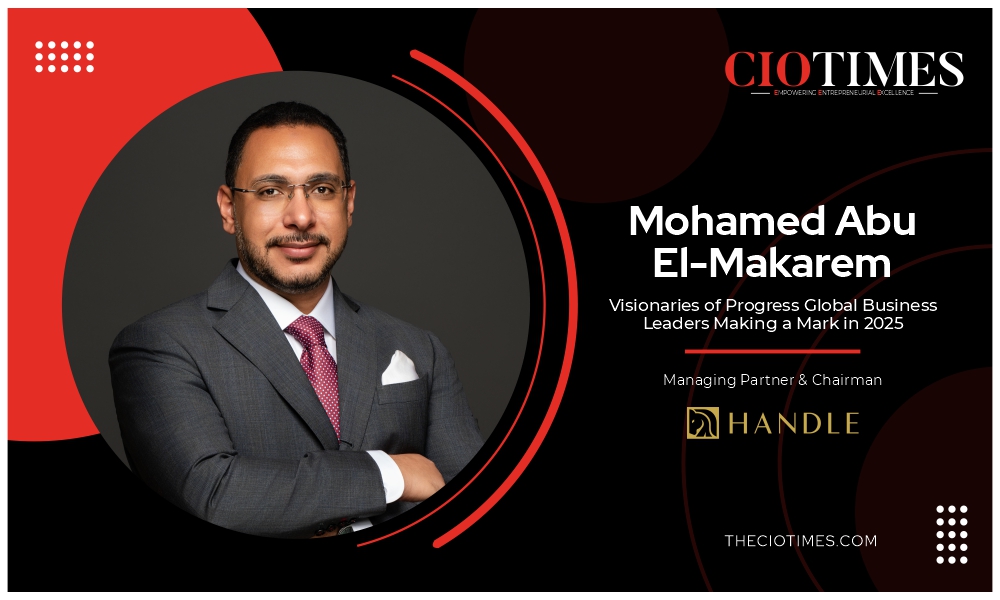Mohamed Abu El-Makarem is the Managing Director & Chairman of Handle, the powerhouse of law and capital. His career began at the frontlines of international negotiation, from military command missions to the United Nations and the European Union, before converging into a new model of executive-driven advisory in the UAE.
From Crisis Rooms to Boardrooms, Leading the Powerhouse of Law & Capital
The Shift Mandate
From sovereign funds to international institutions, Mohamed Abu El-Makarem built his career in capital strategies, preparing for the moment where advisory would have to be redefined.
By-the-Numbers Sidebar
- $38bn+ capital structured and deployed
- 900+ commercial disputes resolved
- 50+ board-level mandates executed
- 20 years of sustained high-volume performance
From Military Negotiation to Commercial Mandates, A Career Defined
Mohamed began his career as a Contracts Negotiation and Liaison of the United States Central Command contingency during the Bright Star military exercise in 2005-2006. For his contribution to the success of the Coalition and Joint Forces Land Component Mission, he was awarded the Certificate of Achievement by Lieutenant General R. Steven Whitcomb, Commanding General, USARCENT.
He later served with the African Union – United Nations Hybrid Operation in Darfur, where he was awarded the UNAMID Medal in recognition of duties in the service of peace. These experiences demanded decisiveness under pressure and integrity in environments where hesitation could not be afforded.
“My career began where hesitation was fatal. It taught me that precision and credibility are the only currencies that matter under pressure.”
European Union Leadership: From Command Rooms to Regional Programmes
Mohamed advanced into European Union leadership, first as Executive Manager of the Euromed PPRD South II programme, directing civil protection, resilience, and crisis management initiatives across the Mediterranean. His work placed him at the center of command operations during natural and man-made crises, where decisions had to withstand scrutiny across multiple governments.
His performance led to recognition within the EU framework, and he was subsequently appointed Executive Manager of the South Mediterranean Regional Office. There, he oversaw multi-country programmes, coordinated regional policy implementation, and built collaborative frameworks for risk preparedness and crisis response.
“In the EU, I learned that negotiation is not dialogue, it is architecture. It is the scaffolding that holds nations steady when crisis strikes.”
From Institutions to the Powerhouse Model
Following his leadership with international programmes, Mohamed made a decisive shift, bringing the discipline of public mandates into the private business world. Where once he mediated under military pressure and institutional complexity, today he commands the negotiation room between investors, boards, and stakeholders.
This evolution gave birth to his vision for Handle, an advisory model built not on fragmentation but on convergence. Law, capital, and strategy would no longer operate in silos. They would be delivered together, as one mandate, inside the institution, with full accountability for outcomes.
“Advisory without execution is theatre. My principle is simple: if I take the mandate, I take the result.”
Why the UAE Became the Proving Ground
Mohamed chose the UAE as the marketplace for his model. Nowhere else do global capital, legal complexity, and entrepreneurial ambition converge with the same intensity. It is a market that rewards discipline, demands precision, and punishes hesitation.
Here, his model of executive-driven advisory found its natural home. Businesses needed more than consultants, private capital needed more than fund managers, and family enterprises needed more than succession lawyers. They needed one powerhouse capable of protecting rights, deploying capital, and scaling strategy without fragmentation.
“The UAE rewards foresight backed by execution. That is why my model belongs here.”
Advising Families Where Legacy Meets Strategy
Family enterprises represent some of the most complex and defining mandates in the UAE. Mohamed applies the same rigor he once used in command centers to help families balance governance, succession, and capital deployment. For him, advisory is not only about protecting assets, but about preserving unity across generations.
He frames family business advisory as engineered continuity. Instead of separating legal, financial, and strategic advice, Mohamed integrates them into a single framework that anticipates generational change, manages governance risks, and aligns ambition with long-term capital structures.
“The most valuable inheritance is certainty. With it, wealth becomes continuity, not conflict.”
Harnessing Technology to Safeguard Continuity
Mohamed sees technology not as disruption but as a force multiplier for advisory. From digital governance systems to AI-driven risk analysis, he integrates tools that enable leaders to act with speed and confidence. For him, technology must simplify decisions, not complicate them.
Looking ahead, he believes the future of advisory in the UAE will be defined by how effectively firms combine human judgment with digital infrastructure. This balance, in his view, is what ensures strategies remain adaptable, transparent, and resilient in the face of volatility.
“Technology has value only when it makes decisions faster, sharper, and more accountable.”
Turning Crises Into Mandates of Discipline
For Mohamed, challenges have always been real-time tests. From negotiating with the United States Central Command to coordinating EU crisis responses, his career was built on situations where hesitation was not an option. Each challenge reinforced the same lesson: when discipline is absent, outcomes collapse.
At Handle, he frames client challenges in the same way. Whether guiding billion-dirham deals or resolving disputes above AED 100M, he sees each mandate not only as a transaction but as a test of execution. Advisory is not measured by plans delivered, but by results secured.
“Every crisis I faced proved one truth: discipline is the strategy that sustains outcomes under any pressure.”
Building the Standard for Executive-Driven Advisory
Mohamed’s legacy is not only the recognition earned in his early career, but the model he has built for the future. Through Handle, he has converged law, capital, and strategy into a single powerhouse of execution, setting a new benchmark for advisory in the UAE. His vision is structural change: one mandate, full accountability, measurable results.
Looking ahead, his goal is for Handle to be the reference point for executive-driven advisory in the region. For Mohamed, the work is not about volume but about impact, clients who lead, institutions that endure, and outcomes that shape markets.
“My ambition is not to grow bigger, but to grow sharper. Depth creates impact, and impact builds legacy.”
Emerging Trends in UAE Family Enterprises
Mohamed observes that family businesses in the UAE are evolving at unprecedented speed. A new generation of leaders is reshaping governance with venture-capital style investments, cross-border continuity planning, and technology-driven oversight. Families are no longer content with static structures, they demand agility, foresight, and resilience.
For Mohamed, this shift is both a challenge and an opportunity. Advisory must now anticipate risks across jurisdictions, while also enabling families to seize opportunities in digital transformation and international capital markets. The mandate is no longer just preservation, but positioning families as active players in global growth.
“The next generation of UAE families is not inheriting the future, they are engineering it.”
What Comes Next for Handle
Looking forward, Mohamed’s vision for Handle is deliberate: depth over volume. The firm will not pursue size for its own sake, but focus on mandates where its integrated model of law, capital, and strategy can deliver measurable impact. In his view, clients do not need another advisor, they need an institution built to lead execution when outcomes are non-negotiable.
The next chapter is about scale with selectivity. Handle will continue to expand its influence in the UAE and beyond, while holding firm to its DNA as the powerhouse of law and capital.
Signature Quotes
- “Leadership is proven when complexity becomes structure, and structure becomes execution.”
- “Passion is not solving problems, it is building institutions that outlive their founders.”
Restructuring a Multi-Nation Programme
One of Mohamed’s most memorable challenges came during his leadership of the Euromed PPRD South II programme. Faced with overlapping mandates, fragmented governance, and multi-country coordination, the programme risked stalling at a critical moment.
Mohamed responded by restructuring its framework, aligning decision-making across governments, and installing operational certainty in the command centers. What had seemed unmanageable was transformed into a functioning platform for cross-border crisis management.
“Complexity is mastered when accountability is enforced. That is how resilient systems are built.”
Quiet Certainty in Leadership
Asked about the legacy he hopes to leave, Mohamed frames it not in terms of titles or transactions, but of trust. His career has been defined by being the one trusted when it mattered most, whether in military negotiations, UN peacekeeping, EU crisis rooms, or billion-dirham boardrooms.
For him, leadership is about structure in complexity and conviction in execution. It is about designing strategies that outlive their architects and leaving behind institutions stronger than they were found.
“Legacy is not measured in years served, but in the certainty you give others when the pressure is greatest.”










